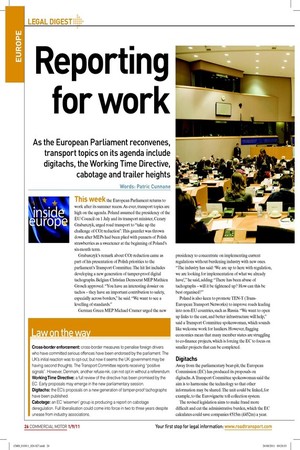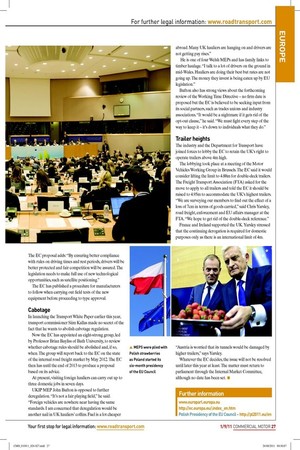Reporting for work
Page 22

Page 23

If you've noticed an error in this article please click here to report it so we can fix it.
As the European Parliament reconvenes, transport topics on its agenda include digitachs, the Working Time Directive, cabotage and trailer heights
Words: Patric Cunnane This week the European Parliament returns to work after its summer recess. As ever, transport topics are high on the agenda. Poland assumed the presidency of the EU Council on 1 July and its transport minister, Cezary Grabarczyk, urged road transport to “take up the challenge of CO2 reduction”. This gauntlet was thrown down after MEPs had been plied with punnets of Polish strawberries as a sweetener at the beginning of Poland’s six-month term.
Grabarczyk’s remark about CO2 reduction came as part of his presentation of Polish priorities to the parliament’s Transport Committee. The hit list includes developing a new generation of tamper-proof digital tachographs. Belgian Christian Democrat MEP Mathieu Grosch approved. “You have an interesting dossier on tachos – they have an important contribution to safety, especially across borders,” he said. “We want to see a levelling of standards.”
German Green MEP Michael Cramer urged the new presidency to concentrate on implementing current regulations without burdening industry with new ones. “The industry has said: ‘We are up to here with regulation, we are looking for implementation of what we already have’,” he said, adding: “There has been abuse of tachographs – will it be tightened up? How can this be best organised?” Poland is also keen to promote TEN-T (TransEuropean Transport Networks) to improve roads leading into non-EU countries, such as Russia. “We want to open up links to the east, and better infrastructure will help,” said a Transport Committee spokeswoman, which sounds like welcome work for hauliers. However, lagging economies mean that many member states are struggling to co-inance projects, which is forcing the EC to focus on smaller projects that can be completed.
Digitachs
Away from the parliamentary bear-pit, the European Commission (EC) has produced its proposals on digitachs. A Transport Committee spokeswoman said the aim is to harmonise the technology so that other information may be shared. The unit could be linked, for example, to the Eurovignette toll collection system.
The revised legislation aims to make fraud more dificult and cut the administrative burden, which the EC calculates could save companies €515m (£452m) a year. The EC proposal adds: “By ensuring better compliance with rules on driving times and rest periods, drivers will be better protected and fair competition will be assured. The legislation needs to make full use of new technological opportunities, such as satellite positioning.” The EC has published a procedure for manufacturers to follow when carrying out ield tests of the new equipment before proceeding to type approval.
Cabotage
In launching the Transport White Paper earlier this year, transport commissioner Siim Kallas made no secret of the fact that he wants to abolish cabotage regulation.
Now the EC has appointed an eight-strong group, led by Professor Brian Bayliss of Bath University, to review whether cabotage rules should be abolished and, if so, when. The group will report back to the EC on the state of the internal road freight market by May 2012. The EC then has until the end of 2013 to produce a proposal based on its advice.
At present, visiting foreign hauliers can carry out up to three domestic jobs in seven days.
UKIP MEP John Bufton is opposed to further deregulation. “It’s not a fair playing ield,” he said. “Foreign vehicles are nowhere near having the same standards. I am concerned that deregulation would be another nail in UK hauliers’ cofins. Fuel is a lot cheaper abroad. Many UK hauliers are hanging on and drivers are not getting pay rises.” He is one of four Welsh MEPs and has family links to timber haulage. “I talk to a lot of drivers on the ground in mid-Wales. Hauliers are doing their best but rates are not going up. The money they invest is being eaten up by EU legislation.” Bufton also has strong views about the forthcoming review of the Working Time Directive – no irm date is proposed but the EC is believed to be seeking input from its social partners, such as trades unions and industry associations. “It would be a nightmare if it gets rid of the opt-out clause,” he said. “We must ight every step of the way to keep it – it’s down to individuals what they do.”
Trailer heights
The industry and the Department for Transport have joined forces to lobby the EC to retain the UK’s right to operate trailers above 4m high.
The lobbying took place at a meeting of the Motor Vehicles Working Group in Brussels. The EC said it would consider lifting the limit to 4.88m for double-deck trailers. The Freight Transport Association (FTA) asked for the move to apply to all trailers and told the EC it should be raised to 4.95m to accommodate the UK’s highest trailers. “We are surveying our members to ind out the effect of a loss of 7cm in terms of goods carried,” said Chris Yarsley, road freight, enforcement and EU affairs manager at the FTA. “We hope to get rid of the double-deck reference.” France and Ireland supported the UK. Yarsley stressed that the continuing derogation is required for domestic purposes only as there is an international limit of 4m.
“Austria is worried that its tunnels would be damaged by higher trailers,” says Yarsley.
Whatever the EC decides, the issue will not be resolved until later this year at least. The matter must return to parliament through the Internal Market Committee, although no date has been set. n














































